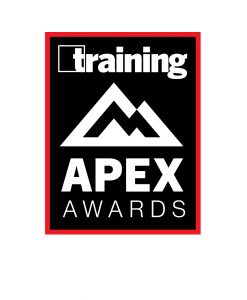Transportation company England Logistics’ Betterment U Pre-Leadership Development Program has two objectives: first, to increase the percentage of leadership positions filled by internal candidates, and second, to increase the readiness of the identified leadership candidates to promote into leadership and perform as more effective leaders through program engagement.
Program Details
The Betterment U Pre-Leadership Program is a full spectrum learning and development program integrating self-study, instructor-led workshops, leader-guided learning application, on-the-job experiential learning, and coaching and mentoring. The content of the program is focused on developing 59 leadership competencies identified by existing frontline and divisional leaders and refined and ratified by company executive leadership.
Competencies are addressed in the following order:
- Personal leadership assessment and development
- Building a foundation of leadership fundamentals
- Participant competency gaps as identified through a series of feedback assessments (completed by the participants and their key stakeholders) and prioritized within their individual leadership Betterment U Plan
- All remaining competencies
Knowledge development via self-study and workshop participation is evaluated based on facilitator observations from workshop engagement and contributions, direct and skip-level leader interviews, and the development of relevant application action plans. Application and experiential development are both evaluated based upon effective completion of targeted action plans.
Short-term reinforcement of the desired leadership competencies is achieved through four key steps of follow-through engagement:
- Weekly one-on-ones between the participants and their leaders as they a) reflect upon the learning obtained through the participant’s self-study and engagement in bi-weekly instructor-led workshops and b) plan ways to implement the principles and practices they have learned through hands-on application opportunities.
- In-class and follow-up question-and-answer exchanges between the participants and the program facilitators—the senior director of Organizational Development and the vice president of Talent Development.
- Return and report follow-up between the participants and their direct leader regarding the effectiveness of their action plans and any resulting knowledge gained and skills developed.
- Monthly engagements with their identified mentor(s) regarding progression in achieving their agreed-upon competency development and leadership readiness goals.
For longer-term reinforcement, the breadth of mentors with whom the participants engage is expanded based upon additional competency gaps the participants need to close. In addition, the company increases levels of quasi- to full leadership responsibilities given to participants within their current team and on divisional and/or company-level project teams and committees.
Results
Two leadership vacancies have been filled by program participants. No frontline leadership vacancies have been filled by external hires since the introduction of the program. All but one division leadership role have been filled internally.





